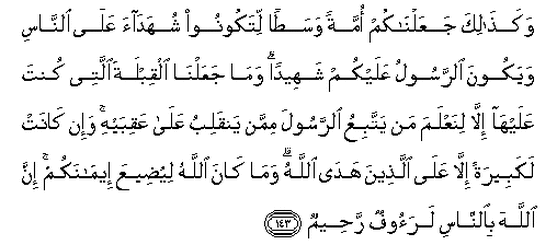Islam for Muslims
Kuntum khayra ommatin okhrijat lilnnasita/muroona bialmaAAroofi watanhawna AAani almunkariwatu/minoona biAllahi walaw amana ahlu alkitabilakana khayran lahum minhumu almu/minoona waaktharuhumualfasiqoona
You are the best nation produced [as an example] for mankind. You enjoin what is right and forbid what is wrong and believe in Allah . If only the People of the Scripture had believed, it would have been better for them. Among them are believers, but most of them are defiantly disobedient. (3:110)
You are the best nation produced [as an example] for mankind. You enjoin what is right and forbid what is wrong and believe in Allah . If only the People of the Scripture had believed, it would have been better for them. Among them are believers, but most of them are defiantly disobedient. (3:110)
ISLAM IN PRACTICE
With the above promise by Allah in his holy Quran, it is indeed disheartening to see the state of Islam and Muslims as they are right now. Truth be told: there is nothing wrong with the religion; Islam is the perfect and a beautiful religion. It is the abandonment of its true teaching that has resulted in the downfall. The history of our fallen empires would be a testament to that. What we see now is the same, but a grander scale.
ISLAM HADHARI
The concept of Islam Hadhari was mentioned by the Malaysian government under the leadership of its former Primer Minister, Ahmad Badawi. I'm a Singaporean, but when I looked at the principles behind Islam Hadhari, it intrigued me. This is the way Islam should be practised. If done properly, it would uplift the quality of Muslims everywhere and the civilisation would be one that would be able to fulfill its role as mentioned in the Quran above (In fact, Islam Hadhari can be defined as Civilisation of Islam).
Islam Hadhari is not new. It is the way Islam was practised during the times of Rasulullah. It should be viewed as the renewal of the old concept, in tandem to the modern era, so that the maxims of the teaching of Islam can help to solve the problems or dilemma of the Muslim ummah efficiently and effectively, in the new age of modernization (Ibrahim JCH, 2007) [adapted from Wikipedia]
There are 10 fundamental principles:
- Faith and piety in Allah
- Just and trustworthy government
- Freedom and independence to the People
- Mastery of knowledge
- Balanced and comprehensive economic development
- Good quality of life for all
- Protection of the rights of minority groups and women
- Cultural and moral integrity
- Protection of the environment
- A strong defence policy
When we look at the principles above, we realise how relevant they are in the modern context, be it in the personal level (individual) right up to the community and country level.
Wakathalika jaAAalnakumommatan wasatan litakoonoo shuhadaa AAala alnnasiwayakoona alrrasoolu AAalaykum shaheedan wamajaAAalna alqiblata allatee kunta AAalayha illalinaAAlama man yattabiAAu alrrasoola mimman yanqalibu AAalaAAaqibayhi wa-in kanat lakabeeratan illa AAalaallatheena hada Allahu wama kanaAllahu liyudeeAAa eemanakum inna Allahabialnnasi laraoofun raheemun
And thus we have made you a justly balanced community that you will be witnesses over the people and the Messenger will be a witness over you. And We did not make the qiblah which you used to face except that We might make evident who would follow the Messenger from who would turn back on his heels. And indeed, it is difficult except for those whom Allah has guided. And never would Allah have caused you to lose your faith. Indeed Allah is, to the people, Kind and Merciful. (2:143)
Being "justly balanced" is the hallmark of a Muslim. We practise moderation. We are neither too laidback nor too overzealous. We do everything with consideration of other things. We are holistic, and the above principles demonstrate this very nicely and aptly.
As an example, now that we've started becoming a better Muslim, it doesn't mean we stop socialising with our colleagues so that we can devote ourselves to Allah. We still do socialise but we are now more aware of our limitations in human interactions and entertainment. Neither do we just spend time in prayer, when our time can be also spent in ibadah (عبادة) helping the community be it in compound cleaning of the masjid, tuition for the underprivileged, etc.
What matters more is the niyyat (نیّة): That we do all this for one reason alone - for the Pleasure of Allah. Not so that we can go to heaven or be recognised...
And thus we have made you a justly balanced community that you will be witnesses over the people and the Messenger will be a witness over you. And We did not make the qiblah which you used to face except that We might make evident who would follow the Messenger from who would turn back on his heels. And indeed, it is difficult except for those whom Allah has guided. And never would Allah have caused you to lose your faith. Indeed Allah is, to the people, Kind and Merciful. (2:143)
Being "justly balanced" is the hallmark of a Muslim. We practise moderation. We are neither too laidback nor too overzealous. We do everything with consideration of other things. We are holistic, and the above principles demonstrate this very nicely and aptly.
As an example, now that we've started becoming a better Muslim, it doesn't mean we stop socialising with our colleagues so that we can devote ourselves to Allah. We still do socialise but we are now more aware of our limitations in human interactions and entertainment. Neither do we just spend time in prayer, when our time can be also spent in ibadah (عبادة) helping the community be it in compound cleaning of the masjid, tuition for the underprivileged, etc.
What matters more is the niyyat (نیّة): That we do all this for one reason alone - for the Pleasure of Allah. Not so that we can go to heaven or be recognised...


